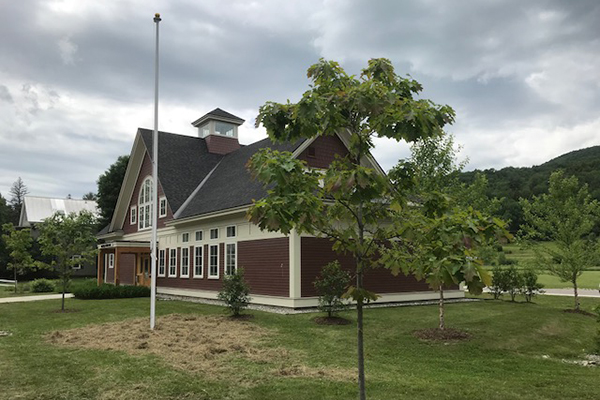Two of Waitsfield’s Select Board members want to keep a portion of the funds that a local option task (LOT) would raise in the town.
Those board members asked its members who sit on a tri-town select board committee negotiating an interlocal agreement to enact a local option tax to raise the issue of splitting some of the revenues raised with the committee.
Waitsfield Select Board member Sal Spinosa, at the board’s June 10 meeting, asked board members Kellee Mazer and Darryl Forrest, who serve on the negotiating committee, to propose a funding split wherein Waitsfield would retain some percentage of the $400,000 that a 1 percent local option tax (LOT) would raise in Waitsfield.
A subcommittee of the Mad River Valley Planning District is proposing a 1 percent LOT on rooms, meals, alcohol and retail sales already subject to the state sales tax. That would raise about $700,000, which would be reinvested in The Valley for attainable housing, transportation, recreation, community projects and recreation.
Town administrator Trevor Lashua prepared a list of policy issues around an LOT for the board to consider, including the question of retaining some percentage for town projects.
“Is there an elephant in the room with the $400,000-plus that Waitsfield will contribute? Are you all thinking it shouldn’t be that much?” Forrest asked.
“I’d be far more pleased if at the moment when Waitsfield takes in these funds that the town allot to itself a certain amount,” Spinosa said.
“What are you thinking?” Forrest asked.
“I don’t have all the data. I haven’t thought about an amount. I don’t have all the specifics,” Spinosa said.
“There’s only one set of LOTs per town. If we use it for this purpose, we can’t do another one. If it’s all of the money for a five-year term, you are committing to meet those bigger obligations with the property tax,” Lashua said.
“What do you want to see? All roads up to a certain condition? Expanded decentralized wastewater projects?” Lashua continued.
“I’m hearing that you want an LOT for Waitsfield to do all these things,” Forrest said.
“As your primary budget writer, if you want to give me an annual $480,000 to plug it, that would make a lot of these exercises easier,” Lashua responded.
“But none of these bells were going off when we were in our budget committee process. Our debt is going down and that’s all we talk about and when we’re going to have money to do capital projects,” Mazer said.
Spinosa reiterated his opinion that some sort of a split was needed and Mazer objected.
“The point of the LOT is to reinvest in the Mad River Valley, in the community. People in Warren spending their money in Waitsfield to pay for Waitsfield’s roads, that’s not going to go over well. And if Waitsfield creates its own LOT, there’s going to be a huge problem between the three towns,” Mazer said.
Board member Jon Jamieson agreed with her.
“I hear your argument,” Jamieson said to Lashua. “With your budget hat on, this would be pennies from heaven. But there’s really two trains of thought. There’s one looking forward to investing in the future of the community and the other train looking at deferred maintenance that we’ve not done and using the money to take care of problems that are in back of us. I get both, but I’m forward leaning and that’s my stance,” Jamieson said.
Spinosa repeated his request that Mazer and Forrest take the idea of a split to the tri-town negotiating committee as well as the idea of a sunset clause. Board chair Paul Hartshorn and Jamieson said they supported the idea of a sunset clause. Hartshorn said that a split would allow the town to work on roads and a town garage.
Jamieson said a sunset clause on the LOT might help sell it to the voters in all three towns who will be asked to pass the tax and said that continued reapproval of the tax would indicate support for it.
Mazer said that the tri-town negotiating committee has already considered and rejected the idea a split.
“We’re a unique space. We depend on those mountains. They are not in our town,” Mazer said.
“Those are their unique interests. They have those mountains. We have everything else,” Spinosa said.
Forrest asked Spinosa if he was seeking a 50-50 split and said that if it happens in Waitsfield, it would have to happen in all three towns.
“Why in each town?” Spinosa asked.
“Is that not fair?” Forrest responded.
Spinosa said he was not suggesting that community projects be denied funds entirely and said a split would make it more saleable.
“I disagree. Anyone I’ve talked to who is on the fence and wants more information does not want a split and doesn’t want those funds going back for local infrastructure,” Mazer added.
In addition to the question of splitting the funds and putting a sunset clause on the program, Forrest said he will also ask the committee about further clarification of the allocations proposed for the five funding areas.
Town residents Bob Cook, Leo Laferriere and Mark and Alice Peal also offered comments on the proposal. Cook said he felt there was a problem with people’s confidence as to how the money would be spent. Mark Peal asked for specifics and details about a meeting that the MRVPD subcommittee held at American Flatbread on May 29 and asked for the list of those who attended and questioned whether The Valley Reporter was present.
Alice Peal said that the state authorized towns to adopt LOTs after the state’s education funding law changed with Act 60. She said LOT legislation was adopted in recognition that Act 60 was going to put increased pressure on the property tax.
Leo Laferriere said he could not support the proposal as it currently exists because there’s not enough structure about it.







